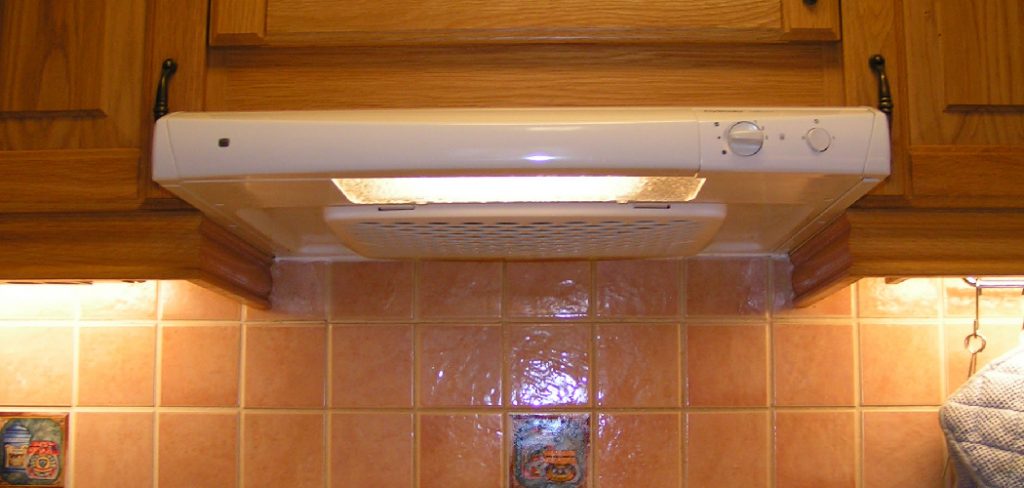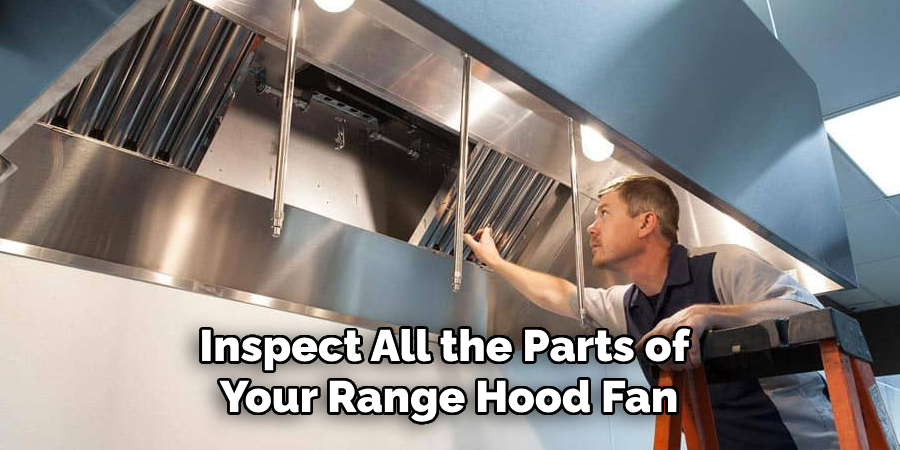A range hood fan is an essential appliance in a kitchen, especially if you regularly cook. It helps to remove excess moisture, odors and smoke that can fill up the room while cooking. However, a noisy range hood fan can be very annoying and disruptive to your daily routine. Whether it’s a constant rattling sound or grinding noise, a noisy range hood fan can be an indication of underlying issues that need to be addressed.

The main advantage of knowing how to fix a noisy range hood fan is that you do not have to call a professional every time the fan makes an unusual noise. By learning how to fix it yourself, you can save both time and money. Read this blog post to learn how to fix a noisy range hood fan.
Step by Step Processes for How to Fix a Noisy Range Hood Fan
Step 1: Inspect the Fan Blade
Check if there is any debris or dirt stuck on the fan blade. If so, remove it and clean the area thoroughly. Sometimes a simple cleaning can solve the noise issue. If the fan blades are loose, they can cause a lot of noise while spinning. Use a screwdriver to tighten the screws and see if it reduces the noise. If not, move on to the next step.
Step 2: Check for Loose Parts
Inspect all the parts of your range hood fan and make sure they are tightly secured. Loose parts can also cause noise when the fan is running. If you hear a squeaking or grinding noise, it could be due to lack of lubrication. Use a silicone-based lubricant to oil the moving parts of the fan. This should reduce the noise significantly.

Step 3: Replace Worn Out Motor Bearings
Over time, the motor bearings can wear out and cause noise. If this is the case, you will need to replace them with new ones. If the fan blades are not properly aligned, they can create a lot of noise while spinning. Use a level to adjust the blades and make sure they are aligned correctly.
Step 4: Check the Fan Belt
If your range hood fan has a belt, check if it is worn out or loose. If so, replace it with a new one to reduce noise. Loose ductwork can cause rattling noises when the fan is running. Use duct tape or metal clamps to secure the ductwork and see if it reduces the noise.
Step 5: Insulate the Ductwork
If your ductwork is not properly insulated, it can cause a lot of noise when the fan is running. Use insulation material to cover any exposed areas and reduce noise.
If none of the above steps work, you may need to consider upgrading your range hood fan to a newer and quieter model. Consult with a professional for recommendations and installation assistance.
Safety Tips for How to Fix a Noisy Range Hood Fan
- Wear protective gear such as gloves and eye goggles when working with any electrical appliances.
- Make sure to unplug the range hood fan before starting any repairs or maintenance work.
- Keep children and pets away from the area while you are fixing the noisy range hood fan.
- Avoid touching any electrical components with wet hands.
- Use a sturdy ladder if you need to access the range hood fan at a height.
- Keep all tools and materials organized and within reach to prevent accidents.
- If you are not confident in your abilities, it is best to seek professional help for fixing the noisy range hood fan.

By following these safety tips, you can ensure a safe and efficient process of fixing your noisy range hood fan.
Troubleshooting Tips for How to Fix a Noisy Range Hood Fan
- Check the vent ducts and make sure they are not clogged with grease or debris. If necessary, clean them out using a degreaser.
- Inspect the fan blades for any buildup of dirt or debris. Wipe them clean with a damp cloth.
- Tighten any loose screws or bolts that may be causing the fan to rattle.
- Apply lubricant to the motor and bearings to reduce friction and noise.
- If the fan blades are damaged, they may need to be replaced.
- Check the blower wheel for any cracks or wear. If damaged, it may need to be replaced.
- Inspect the fan motor for any signs of wear or damage. If necessary, replace the motor.
- Turn on the range hood fan and listen for any unusual noises. If the noise persists, there may be a more serious issue that requires professional assistance.

These troubleshooting tips can help you identify and fix common causes of a noisy range hood fan. Remember to always follow safety precautions and consult a professional if needed for more complex repairs. A quiet and efficient range hood fan is essential for a peaceful cooking experience, so don’t ignore any noises coming from it.
What Are the Common Reasons for a Noisy Range Hood Fan?
There are several possible reasons why your range hood fan may be making noise. These include:
- Buildup of Grease and Debris: Over time, the vent ducts and fan blades can become clogged with grease and debris from cooking. This buildup can cause the fan to make loud rattling or grinding noises.
- Loose Screws or Bolts: If the fan blades or other components are not properly secured, they may rattle or vibrate when in use.
- Lack of Lubrication: Without proper lubrication, the motor and bearings can create friction and make loud noises while running.
- Damaged Parts: If any components of the range hood fan are damaged, such as the blower wheel or fan blades, they may create loud noises.
- Age and Wear: As the range hood fan gets older, it may start to make more noise due to wear and tear on its components.
By identifying the cause of the noise, you can take the necessary steps to fix your noisy range hood fan and prevent any further issues in the future. Remember to always approach repairs with caution and follow safety tips to ensure a safe and successful outcome. By keeping your range hood fan in good working condition, you can enjoy a quieter and more efficient cooking experience.
Preventive Maintenance Tips for a Noisy Range Hood Fan
To avoid dealing with a noisy range hood fan in the first place, here are some preventive maintenance tips to keep it running smoothly:
- Regularly clean the vent ducts and fan blades to prevent buildup of grease and debris.
- Check all screws and bolts on a regular basis and tighten them if necessary.
- Keep the motor and bearings properly lubricated according to manufacturer’s instructions.
- Inspect all components for any signs of wear or damage, and replace as needed.

By taking these preventive maintenance steps, you can extend the lifespan of your range hood fan and prevent any potential noise issues. In addition, maintaining a clean and well-functioning range hood fan can also improve the air quality in your kitchen by effectively removing smoke, steam, and cooking odors.
Can Regular Maintenance Prevent a Range Hood Fan From Becoming Noisy?
While regular maintenance can help prevent some common causes of a noisy range hood fan, it cannot guarantee that your fan will never make noise. Factors such as age and wear, as well as external factors like power surges or faulty electrical wiring, can still cause unexpected noise issues with your range hood fan.
However, by following preventive maintenance tips and addressing any potential issues early on, you can greatly reduce the chances of your range hood fan becoming noisy and ensure a quieter and more efficient cooking experience. Keep your range hood fan in good shape with regular maintenance to avoid unexpected noise disruptions.
What Are Some Common Mistakes People Make When Trying to Fix a Noisy Range Hood Fan?
When dealing with a noisy range hood fan, it can be tempting to try and fix the issue yourself. However, there are some common mistakes that people make when attempting to fix their range hood fan that can actually exacerbate the problem. One of the most common mistakes is tightening all of the screws on the fan housing. While this may seem like a logical solution, it can actually make the fan even louder. The screws are designed to be slightly loose, allowing for proper vibration absorption.
When tightened too much, the fan can vibrate against the housing and create even more noise. Another mistake is attempting to lubricate the fan motor with WD-40 or other household lubricants. While this may temporarily reduce noise, it can ultimately damage the motor and lead to further issues down the line. Additionally, many people overlook proper maintenance of their range hood fan. Regularly cleaning and replacing filters can help prevent buildup of debris and grease, which can cause the fan to become louder over time.
Conclusion
In conclusion, having a noisy range hood fan can be a nuisance and it’s important to address the issue as soon as possible. Whether it’s a grinding, rattling or humming noise, there are several common causes for a noisy range hood fan. By following the steps outlined in this blog post, you’ll be able to troubleshoot and fix the problem yourself.
Remember to start by cleaning and lubricating the fan blades, as this is often the main culprit for a noisy range hood fan. If that doesn’t solve the issue, check for loose screws or damaged motor bearings. Also, make sure to properly secure any ductwork connected to the range hood. I hope this article has been beneficial for learning how to fix a noisy range hood fan. Make Sure the precautionary measures are followed chronologically.
